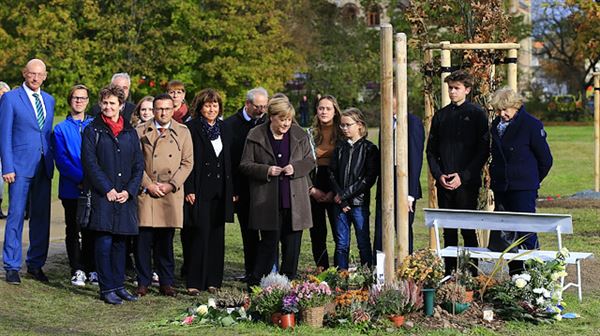Chancellor Angela Merkel on Monday visited a memorial to the victims of neo-Nazi terror group and called for courage and responsibility to combat raci
Chancellor Angela Merkel on Monday visited a memorial to the victims of neo-Nazi terror group and called for courage and responsibility to combat racism.
Merkel, together with a group of students, laid white flowers on the memorial in the eastern German city of Zwickau, which was dedicated to 10 people killed by the NSU terror group.
“As I have promised the family members of the victims several years ago, we as the Federal Government, would do everything to prevent these crimes from ever occurring again,” she said.
“But for this, we also need courageous people, and it’s good that today we’re here with young people, who are saying that they would like to ensure that such things would not happen in Germany again,” she added.
The NSU members, who lived underground for many years in Zwickau, killed eight Turkish immigrants, a Greek citizen, and a German policewoman between 2000 and 2007.
The German public first learned about the group’s existence in 2011, when two of its members died on Nov. 4 during a bank robbery attempt. Various propaganda materials, guns and weapons were later found in the wreckage of the NSU apartment in Zwickau.
Until 2011, Germany’s police and intelligence services excluded any racial motive for the murders and instead treated immigrant families as suspects with alleged connections to mafia groups and drug traffickers.
During Merkel’s visit to the memorial in Zwickau, dozens of right-wing demonstrators protested the chancellor, shouting slogans such as “Merkel must go” and “Stop the propaganda”.
The memorial with commemorative trees was vandalized last month and a tree for Enver Simsek, the NSU’s first victim, was destroyed by unknown suspects.
Germany has witnessed growing xenophobia and anti-migrant hatred in recent years, fueled by the propaganda of neo-Nazi groups and the far-right Islamophobic Alternative for Germany (AfD) party.
The police recorded more than 19,000 far-right crimes in 2018, according to the latest government figures, with extremists committing some 1,000 violent attacks against foreigners, immigrants or political rivals.
Almost 500 people were injured in attacks inspired by far-right ideologies.
